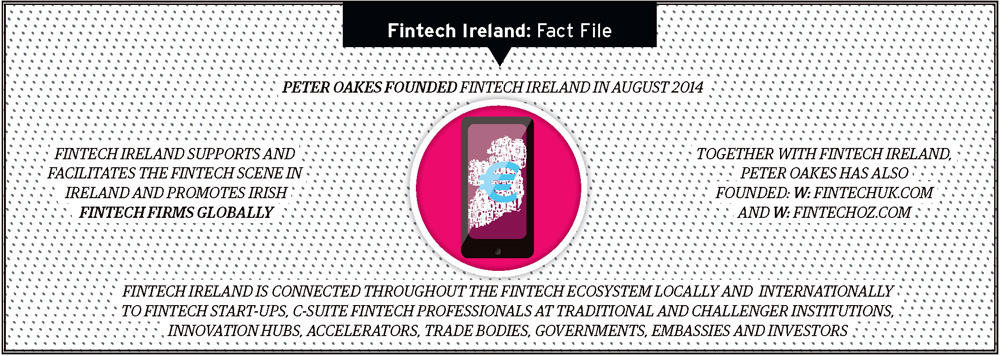Peter Oakes talks to Niamh Mac Sweeney about the challenges and opportunities for Ireland’s fintech industry, and the pioneers shaping its future.
Q: How is the fintech industry performing in Ireland?
Fintech is a bit of a catch word right now. Some think that this industry was born yesterday. However, Ireland has long been the home for many technology firms servicing financial services since the start of the IFSC.
Q: What is driving this evolution?
As technology has enabled greater interaction, many of the tech pioneers turned their attention to financial services, such as payments and mutual funds. Jump forward to today and we are creating a dynamic fintech ecosystem, deeper and wider than the pioneers may have ever contemplated.
Q: What are the key trends and investments taking place in the fintech industry in Ireland?
In Ireland, like elsewhere around the world, everyone is doing their own thing but they are generally pulling in the same direction – from the Government, incubators, accelerators and support groups like Fintech Ireland.
It is great to see Ireland make a statement of commitment to fintech in the IFS2020 strategy. It’s difficult to get any accurate figures for investment in fintech globally. Reports range from $13.8bn to $22bn in 2015. In the case of Ireland, the figure for 2015 is reported to be $631mn. That’s not a bad performance.
Q: Some of these fintech companies are early stage and fast growth companies. How did these companies come to be established and why is their growth prospects and potential so great?
Some are established by experienced industry hands, others by less experienced but visionary millennials. What they all share is a passion for delivering financial services which are far more connected, efficient, better and cheaper than that being provided by the traditional banking, insurance, payments and investment industries.
Some were established to ‘cherry pick’ specific aspects of the banking and insurance value chain. These players don’t wish to provide, for example, a full banking service, but rather focus on specific services, such as foreign currency (CurrencyFair), money remittance (TransferMate) and providing credit (Grid Finance).
The real revolution in fintech is the application of data analytics and artificial intelligence
Others are gearing up for new EU regulations which will allow non-banks to use existing bank infrastructure to provide bank accounts and without being a full blown bank.
This is a sea-change, but the real revolution in fintech is the application of data analytics and artificial intelligence to this new banking model (such as Cogni). And the same applies to insurance, such as peer-to-peer personal and motor vehicle insurance and to asset management, which is being disrupted by such creatures as ‘robo-advisers’. The growth prospects for some of these innovative disrupters are quite staggering.
Q: What can we expect from these pioneers in the future?
Don’t expect gigantic profits overnight: rather focus on transaction volumes and revenue generating capability. If this sounds fanciful, think of the success of another tech firm – Facebook. It’s a straight-forward social media play that just happens to sell advertising as an added value service.
Its sales turnover increased by a whopping 51.9% to $5.4bn last quarter and the number of active users jumped 15% year-on-year to a staggering 1.65bn. That’s the power of the internet – interconnectedness.
If you consider that the US fintech firm Stripe processes about $20bn a year, having only been established in 2010, then you might find it hard to believe that it is valued at $5bn plus. When you think that Irish fintech pioneer firm Realex Payments, which in 2015 processed €28bn ($9.2bn more than Stripe), was purchased by a global heavy weight for €115mn last year ($4.23bn less than Stripe), you might feel that Irish fintech firms are a better buy?

With regard to supporting and fostering fintech start-ups in Ireland, what are the conditions for these early stage enterprises, what are the challenges, and are there enough supports for them to succeed?
First and foremost, the question which every entrepreneur must consider is whether proposed funding terms are fair. Many start-ups obtain their first round of financing, in addition to the founders’ own pockets, from family and friends. After that, things are not necessarily easy in Ireland, leading many to look to London and further a field where investors don’t seek as much equity as those in Ireland.
To me this is critical. Ireland really needs to up its game in this space if it wants to keep local talent ‘local’. It is great that we have programmess like those of Enterprise Ireland, accelerators and innovation hubs which can provide advice, strategic thinking and access to both mentors and potential clients.
But if the level of funding is insufficient, if the amount of equity give-up is too much, if investment terms sheets are too one-sided and convoluted, then of course our fintech industry entrepreneurs must look overseas where, quite frankly, investors ‘get it’.
Q: What should investors look for and how should they approach a potential deal?
I know of deals in Ireland where investors in syndicated deals walked away because one of the co-investors imposed so many conditions that the cost of due diligence made the deal uneconomical. Fortunately, another source of funding was located and the deal went ahead. However, I am not so sure that the international investor will be rushing to join another majority Irish syndicated fund rising in the near future.
Irish investors need to understand that they operate in a global world. We also don’t have that many established technology investors in Ireland. The UK, USA and Nordics region adopt a more holistic approach when investing in fintech. They are not looking to make an immediate buck off the transaction.
They know we are going through the fourth industrial revolution. This is especially the case when it comes to overseas public and co-operative society investors. They share their countries’ view that it is best to future proof their economies by establish high-tech and high-value jobs and industries.
I have seen first-hand offers which other countries are making to entrepreneurs, such as interest free ‘settling-in’ grants and loans, free accommodation for staff, rent-free cars and six figure non-recourse investments, all for no equity give-up.
Q: Are there enough incentives in Ireland for fintech companies to establish a base here?
It is fair to say that Ireland may not be the most competitive, but it is certainly in the top half, perhaps top quartile, in terms of attracting fintech firms to establish a base here. Not everyone will agree. It depends on where your fintech business is on the maturity curve and of course the specific area which you are focussing upon.
IDA Ireland has had many great successes in getting blue chip technology firms to set up in Ireland. Many of these, such as Microsoft, have turned their attention to financial services and have thus morphed into fintech while here. Other fintech and payments giants, such as First Data, are increasing their Irish footprint through strategic expansions.
Irish investors need to understand that they operate in a global world … They know we are going through the fourth industrial revolution
But it’s a different thing altogether when it comes to the smaller entrepreneur which either moves to Ireland to establish their HQ or locals who set up here.
It’s hard to sell Ireland when they feel that availing of Enterprise Ireland’s funding offers means giving up 10% of their company for €50k. I am not saying that this is the correct characterisation of the schemes, but unfortunately this is the perception many have when they read through the T&Cs.
It is not until firms meet with Enterprise Ireland do they get the fuller picture and hear the context explained. And let’s remember, that we have many successful home grown stories including Trustserv, Fernergo, Corlytics, Currency Fair and Deposify where Enterprise Ireland has travelled with them on their journeys.
Q: Does Ireland have the capabilities to establish itself as a regtech centre of excellence?
Without doubt, the answer is ‘yes’. We excelled in regtech long before people noticed its existence. Companies like Norkom forged this market. In recent years we’ve seen the birth of great Irish regtech players which are exporting, including Corlytics and Fenergo.
This area is ‘big data’ and analytics driven. Arguably Irish firms like Corvil have pioneered the work leading to this new regtech space, and there is a lot of promise here.





